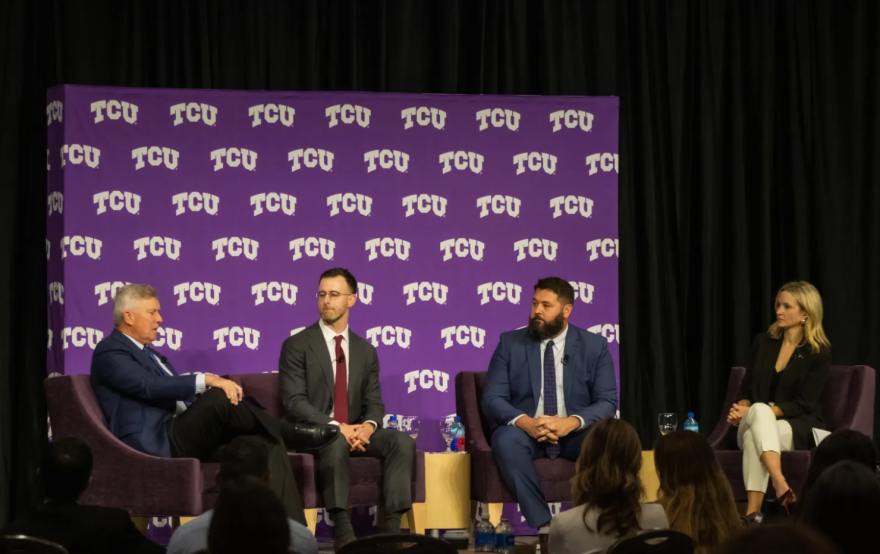In 2022, Mayor Mattie Parker of local leaders to figure out how Tarrant County could best tackle the growing issue of maternal morbidity.
Three years later, in a ballroom at Texas Christian University, she reiterated the importance of confronting an issue like maternal health head-on, quoting advice given to her by her friend and former U.S. Army Secretary Pete Geren.
“You can’t romanticize or admire the problem. You have to focus on the solutions,” Parker said.
Monday saw the launch of the , a collaboration to reduce high maternal morbidity rates in the Fort Worth-Dallas region.
The accelerator boasts a coalition of over 120 partner organizations and 11 principal philanthropic partners, which have committed nearly $25 million. The Episcopal Health Foundation and the Michael & Susan Dell Foundation are the largest funders.
What will the accelerator do?
- Directly provide patients with iron pill tablets meant to decrease complications during pregnancy.
- Increase access to doulas.
- Increase access to community resources such as .
- Increase training around severe obstetric complications for medical professionals.
- Provide hospitals a better platform to share information.
Work from the accelerator has already begun, with 15,000 bottles of iron pills already distributed to North Texas mothers this year.
“Our success reflects the fact that North Texas is the best laboratory for disruptive approaches to better maternal health care in the country,” said Cameron Combs, senior director of the Child Poverty Action Lab.
The money is tied to outcomes. If the accelerator doesn’t reduce severe obstetric complications by 20% in three years, funding stops. That’s a reduction target of about 600 cases a year, Combs said.
Initial data from the accelerator’s efforts will come in fall 2026, said Dr. David Nelson, division chief of Maternal-Fetal Medicine at UT Southwestern Medical Center.
Although the coalition was first convened in Fort Worth, the accelerator sees a marriage of efforts from organizations in the two largest North Texas counties. TCU Burnett School of Medicine and UT Southwestern are leading the charge, with the Dallas-based hospital providing much of the research defining the accelerator’s work.
Who are the 11 philanthropic supporters of the accelerator?
- Child Poverty Action Lab, coordinator.
- Episcopal Health Foundation.
- Michael & Susan Dell Foundation.
- Arlington Tomorrow Foundation.
- Doss Foundation.
- George & Fay Young Foundation.
- Harold Simmons Foundation.
- Kimberly-Clark Foundation.
- North Texas Community Foundation.
- Sid W. Richardson Foundation.
- Rainwater Charitable Foundation.
UT Southwestern’s research found that taking iron during pregnancy reduces the need for blood transfusions during childbirth by a third.
Nelson, who also serves as co-investigator of the accelerator, said the group’s research also looked at the societal causes, including access to food and transportation, that may act as a care barrier and result in iron deficiencies for mothers.
“If you’re going to ask these sensitive questions, you better have an answer back,” Nelson said. “It’s very hollow and feels like a tourist if we’re just asking. Let’s do something about it.”
The term “accelerator” is not cosmetic. The coalition of partners, funds and research was done quickly in order to get work started, Parker said.
“(In) my time working in government at every level, I truly have never seen any initiative take root this quickly,” Parker said.
There are often challenges to deploying solutions found during lab research, Nelson said.
Dr. Stuart D. Flynn, dean of TCU’s medical school and the project’s lead principal investigator, noted research is also often siloed within academic medical circles. The accelerator is meant to break down those barriers.
“Our laboratory is our community, and that makes a big difference,” Flynn said. “We’re not allowing silos to happen in our community trying to make progress in maternal care.”
Much of the work coalescing accelerator partners was done by the Child Poverty Action Lab, an organization that identifies positively effecting changes in maternal health as central to reducing child poverty.
Combs said the lab connects philanthropic funding with the clinical side, in effect uniting all involved.
The federal government’s Advanced Research Projects Agency for Health initially awarded the accelerator $15 million, but in August as part of a wave of federal funding cuts.
Combs told the Fort Worth Report in August that the support of the 11 philanthropic funders during that time was “deeply humbling.”
“This is hard news, but the response has been truly inspiring and a testament to the commitment and the power of regional coalition-making,” Combs said in August. “We’re going to keep the foot on the gas.”
On Monday, Combs confirmed the accelerator has enough funds to start the work.
“There’s more that we need to do to continue to mobilize funding from different partners, both private and public,” Combs said. “So we continue to have those conversations.”
Ismael M. Belkoura is the health reporter for the Fort Worth Report. Contact him at ismael.belkoura@fortworthreport.org.
Disclosure: Sid W. Richardson Foundation, North Texas Community Foundation, Rainwater Charitable Foundation and Arlington Tomorrow Foundation are financial supporters of the Fort Worth Report. At the Fort Worth Report, news decisions are made independently of our board members and financial supporters. Read more about our editorial independence policy .
This first appeared on and is republished here under a .

